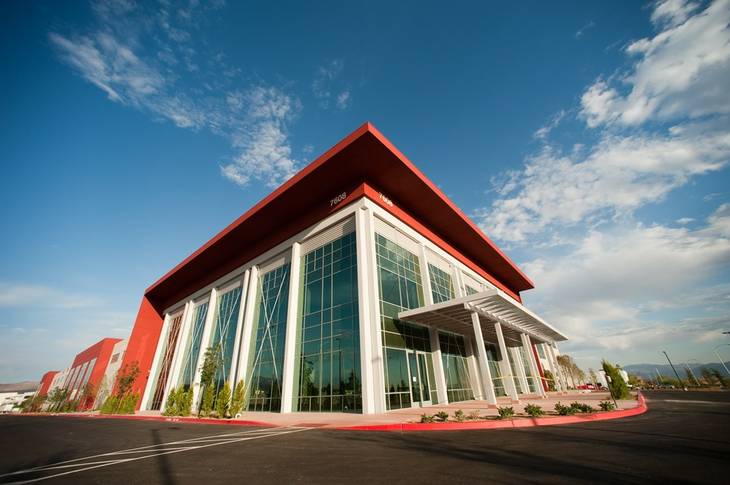When the tires of your car kiss the curbing at the front of a space in the parking garage, consider this: That nondescript block on the ground may have been your desktop computer in a prior lifetime.
That’s one of the products U.S. Micro Corp., a computer recycling company formerly based in Smyrna, Ga.. that has built a new 130,000-square-foot plant and headquarters in Las Vegas, manufactures from machine parts that once functioned as Dells, Hewlett-Packards and Apples. The company also makes bike racks and plastic lumber products from recycled computers.
Tuesday was opening day for the new $15 million Las Vegas plant at the Las Vegas Beltway and Buffalo Road, said U.S. Micro founder and CEO Jim Kegley.
While selling parking curbs and bike racks is a nice bonus for the company, Kegley said, the most important mission for U.S. Micro is to remove and destroy data from the computers they recycle so that they don’t get into the hands of identity thieves.
“It’s all about the data,” he said. “The key is making sure you’re catching all of it.”
U.S. Micro does that by sending employees to the site of the customer’s facility to begin the process of removing data before moving any hardware. The company encourages customers to watch the data destruction process and does it on site to prevent any concerns about data being lost or stolen during the transportation of hardware to the recycling plant.
The company, a sponsor for the International Association of IT Asset Managers conference at Aria this week, works primarily with Fortune 500-sized businesses and will use the Las Vegas plant as its West Coast recycling center. About 10 companies nationwide compete in the IT asset disposition industry.
U.S. Micro’s new operation is about 75 percent functional and awaiting some final state and county permitting to be fully on line. The company is showing off the plant this week to people attending the IAITAM conference, but will have a larger bash when the Consumer Electronics Show comes to town in early January.
When the plant is fully operational in about a year, it will have 100 employees, most of whom will be hired locally. Kegley said a handful of executives would move here from Georgia. The company is offering an average wage of $26.16 an hour.
Kegley said about 90 percent of the computers his company recycles, mainly those that are less than six years old, are refurbished and resold. U.S. Micro has an agreement with several software suppliers to upgrade old computers so that they can be shipped overseas or sold to schools and some government agencies.
The 10 percent of the computers that are too old to refurbish are relegated to a new, different purpose and are tagged for “demanufacturing.” After some of the valuable and recyclable metals are removed, the computers are separated, shredded and crushed before being turned into new products.
While U.S. Micro has been planning its arrival in Las Vegas for months, it made its first public appearance in June when it was successful in its bid for tax abatements, deferrals and employee training grants from the Nevada Commission on Economic Development.
At the time, Kegley said he decided to build in Las Vegas because of transportation access, the ease of logistics and the low tax climate.
“The more we looked around, the more we realized Las Vegas was the ideal place for us,” Kegley told commissioners at the meeting. “We wanted to be near California without being in California.”
Now, Kegley is all in for Las Vegas.
His business card is a casino chip, and he’s telling others in the IT industry that the city is an ideal business location.
While Kegley is getting familiar with the Southern Nevada business community and the area’s many gaming companies, he said U.S. Micro won’t be in the business of decommissioning and recycling old slot machines.
The main reason is that many of the computer systems in slot machines contain proprietary information that the companies don’t want to see recycled into a competitor’s hands.
The company has a track record for philanthropy, working with the American Cancer Society, Austin Partners in Education, Computers for Youth, Women with a Cause and the East Atlanta Kids Club. Kegley personally directs the company’s Give Back to the Community Program.
Once the new plant is established, Kegley said he plans to set up two days a year for local residents to be able to recycle their old computers.
Just as it does for the Fortune 500 countries, U.S. Micro will invite people bringing their computers to the plant to witness the data destruction so they can be assured that their private information doesn’t fall into the wrong hands.
